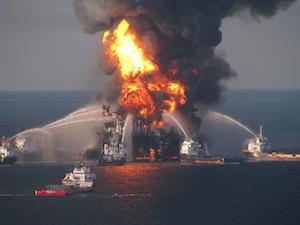Post-BP oil disaster: Not much has changed, right?
Photo of the Deepwater Horizon disaster.
This story was originally covered by PRI’s The Takeaway. For more, listen to the audio above.
It’s been a year since the Deepwater Horizon disaster sent millions of barrels of oil spilling into the Gulf Coast. Ecologically, “the gulf appears to be recovering nicely,” David Biello, an editor at Scientific American told PRI’s The Takeaway. “I say appears to be because we don’t really know what the long-term impacts are going to be.”
Experts know basically where the water washed up onshore, but the oil that stayed offshore is still a mystery. “It dispersed in the water, and it’s become so minute that we lost track of it,” according to Biello. Some of the oil ended up in algae, some in the food chain, some of that algae sank to the bottom and now coats the ocean floor.
“The studies of all that are ongoing,” Biello says. “And the problem is, we won’t know the definitive answers about all of this for 3 to 5 years while the studies are being done.” He adds, “science can’t give you those answers today.”
The general public also knows very little about what’s changed in US energy policy. “A lot of things have changed on the outside,” according to Lisa Margonelli, Director of the Energy Policy Initiative at the New America Foundation. “We know that the regulators are spending a little more time reading the applications than they were before, because they basically weren’t reading them before.”
For substantive reforms, however, Margonelli says, “We don’t know what’s actually going on inside the department of interior.”
We do know that it would be very difficult to wean the US off Gulf Coast oil. “The Gulf was really like the US’s default energy policy,” according to Margonelli. “We treated it like a factory, and we didn’t have proper regulation, and we didn’t have proper concern, I think, on the part of environmental groups to get in there and fight.”
It may now be too late for real energy reform stemming from the BP oil spill. “Because we dispersed the oil droplets, at the same time, we dispersed the anger, we dispersed the political will,” Margonelli says. “We just sort of let this huge ecological disaster happen, and we have not moved forward. We have not moved on our energy policy.”
————————————————————–
“The Takeaway” is a national morning news program, delivering the news and analysis you need to catch up, start your day, and prepare for what’s ahead. The show is a co-production of WNYC and PRI, in editorial collaboration with the BBC, The New York Times Radio, and WGBH.
Every day, reporters and producers at The World are hard at work bringing you human-centered news from across the globe. But we can’t do it without you. We need your support to ensure we can continue this work for another year.
Make a gift today, and you’ll help us unlock a matching gift of $67,000!
